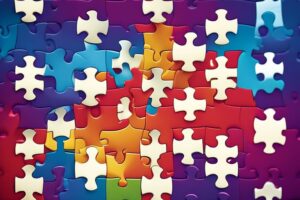Autism is a condition that affects how individuals communicate and interact with the world. It is important to recognize that people with Autism have diverse abilities and strengths, which should be celebrated and embraced. In this blog post, we will explore the various talents and unique qualities that individuals with Autism possess, shedding light on their incredible potential. Prepare to be inspired by the remarkable abilities of these individuals as we debunk common misconceptions and promote understanding and acceptance.
Recognising the diverse abilities and strengths of individuals with Autism
Recognizing the diverse abilities and strengths of individuals with Autism is crucial for society to embrace neurodiversity and promote inclusivity. Many individuals with Autism possess unique talents and skills that can contribute significantly to various fields. For instance, individuals with Autism often excel in pattern recognition, thanks to their keen attention to detail and ability to spot connections that others may overlook. Their exceptional memory skills are also noteworthy, as they have the capacity to recall vast amounts of information with high accuracy. Additionally, individuals with Autism often possess a unique visual thinking style, enabling them to approach problem-solving and creativity in innovative ways. By harnessing their specialized interests and providing support in sensory-friendly environments, individuals with Autism can thrive and make meaningful contributions. It is crucial to celebrate their diverse abilities and strengths and create a society that embraces and supports neurodiversity.
Here’s a table summarising the unique abilities and strengths of individuals with Autism:
| Abilities and Strengths of Individuals with Autism | |
|---|---|
| Enhanced Pattern Recognition | Keen attention to detail and ability to spot connections others may overlook |
| Exceptional Memory Skills | Ability to recall vast amounts of information with high accuracy |
| Attention to Detail | Thoroughness and precision in tasks |
| Specialized Interests | Passion and expertise in specific areas, offering unique insights and creativity |
| Visual Thinking Style | Unique approach to problem-solving and creativity |
| Sensory Sensitivities | Heightened sensitivity to sensory stimuli |
| Neurodiversity | Value of diverse perspectives and contributions in society |
II. Intellectual Abilities
Enhanced pattern recognition in individuals with Autism
Individuals with Autism often exhibit enhanced pattern recognition abilities. They have a unique talent for recognizing and identifying patterns in various contexts, such as numbers, shapes, music, and even social interactions. This heightened ability can manifest as a keen eye for detail and an exceptional ability to detect subtle patterns that others may overlook. It is this distinctive strength that allows individuals with Autism to excel in fields such as mathematics, music, and computer science, where pattern recognition is crucial. These individuals can contribute valuable insights and innovative problem-solving approaches based on their exceptional pattern recognition skills.
Exceptional memory skills in individuals with Autism
Individuals with Autism often possess exceptional memory skills. They can recall specific details and facts with incredible accuracy. This is known as eidetic or photographic memory. People with Autism may have a heightened ability to remember visual and auditory information, which can be advantageous in various areas. Their ability to retain vast amounts of information can make them valuable assets in fields such as research, data analysis, and academia. Encouraging and nurturing their memory skills can help individuals with Autism thrive and contribute their unique talents to society.
Here’s a table highlighting the exceptional memory skills of individuals with Autism:
| Strength | Description |
|---|---|
| Exceptional memory skills | Individuals with Autism often have a remarkable ability to remember details and facts. |
| Eidetic or photographic memory | Some individuals with Autism possess eidetic or photographic memory, allowing them to recall information with precision. |
| Enhanced retention of visual and auditory information | People with Autism may have a heightened ability to remember visual and auditory information. |
| Valuable in research and data analysis | Exceptional memory skills can be beneficial in fields such as research, data analysis, and academia. |
III. Attention to Detail
Attention to detail as a characteristic strength of individuals with Autism
Individuals with Autism often possess a remarkable attention to detail, which can be considered one of their characteristic strengths. Their ability to focus on small details and notice nuances that others may overlook can be invaluable in various fields. This attention to detail is particularly valuable in domains that require precision and accuracy, such as engineering, computer programming, and quality control. Their meticulousness and ability to spot errors or inconsistencies can contribute to enhanced problem-solving and improved outcomes. Embracing and harnessing this strength can lead to greater innovation and success in industries that rely on precision and attention to detail.
The role of attention to detail in fields like engineering and computer programming
Individuals with Autism often exhibit a strong attention to detail, which can be a valuable asset in fields like engineering and computer programming. Their ability to focus on intricate aspects of a problem or task allows them to identify patterns, spot errors, and come up with innovative solutions. This attention to detail is particularly beneficial in industries that require precision and accuracy. In engineering, for example, individuals with Autism can excel in tasks such as quality control, design analysis, and troubleshooting. Similarly, in computer programming, their keen eye for detail enables them to write efficient, error-free code and excel in tasks that require debugging and problem-solving. By leveraging the unique strengths of individuals with Autism, industries can tap into a valuable pool of talent and create inclusive work environments that celebrate diversity.
IV. Specialized Interests
Exploring the passion and expertise of individuals with Autism in specialized interests
Individuals with Autism often exhibit intense passion and expertise in specialized interests. They may develop an encyclopedic knowledge of a specific subject, such as dinosaurs, history, or mathematics. This deep level of focus and dedication allows them to acquire a remarkable level of expertise in their chosen field. Their enthusiasm and attention to detail can result in unique contributions and innovative perspectives. It is important to support and encourage individuals with Autism in pursuing their passions, as it can lead to personal fulfillment and provide valuable insights in various domains.
Here are some key points about the passion and expertise of individuals with Autism in specialised interests:
- Intense focus: Individuals with Autism are known for their ability to concentrate deeply on specific topics, often to the exclusion of other interests.
- Expertise and knowledge: They have the potential to become highly knowledgeable and well-versed in their chosen areas of interest, surpassing the comprehension of neurotypical individuals.
- Unique insights: Their different way of thinking and processing information can lead to original ideas and fresh perspectives that may not be apparent to others.
- Contribution to society: Their specialized knowledge and expertise can be harnessed in various fields, from academia to creative industries, bringing new insights and advancing knowledge.
- Personal fulfillment: Engaging in their passions provides individuals with Autism a sense of purpose, achievement, and personal growth.
It is crucial to recognize and nurture the interests of individuals with Autism, providing them with opportunities to further explore and develop their expertise. By embracing their unique strengths and contributions, we can create a more inclusive and diverse society.
Harnessing the benefits of specialised interests in education and career
Harnessing the benefits of specialized interests in education and career is crucial for individuals with Autism. Their intense focus and knowledge in specific areas can be leveraged to foster their learning and professional growth. By incorporating their interests into educational curricula, educators can create engaging and personalized learning experiences that tap into their expertise. In the career realm, employers can provide opportunities for individuals with Autism to apply their specialized skills and knowledge, contributing to innovation and productivity. This inclusive approach benefits both individuals with Autism and the organizations they work for.
Some ways to harness the benefits of specialised interests in education and career include:
- Personalised Learning: Tailoring educational programs to incorporate individuals’ special interests can enhance their motivation and engagement, leading to deeper learning and improved academic outcomes.
- Vocational Training: Offering vocational training programs that align with individuals’ interests allows them to develop expertise and skills in areas they are passionate about, increasing their chances of success in the job market.
- Job Matching: Identifying job roles that align with individuals’ specialized interests can lead to fulfilling and meaningful careers. Matching individuals’ strengths with relevant job opportunities enhances job satisfaction and productivity.
- Entrepreneurship Opportunities: Encouraging individuals with Autism to pursue entrepreneurial ventures related to their specialized interests can provide them with autonomy and the ability to monetize their skills. This not only promotes self-employment but also empowers them to contribute to the economy.
By recognizing and valuing the unique strengths and abilities of individuals with Autism, society can create a more inclusive and supportive environment that allows them to thrive in education and career settings.
Here are some organisations and resources that support Autism awareness and understanding:
- Autism Speaks: The world’s leading autism advocacy organization providing resources, support, and information for individuals with Autism and their families.
- National Autistic Society: UK-based organization providing support, advice, and resources for individuals with Autism and their families.
- AsIAm: Irish autism charity focused on advocacy, support, and education.
- Autistic Self Advocacy Network: Non-profit organisation run for and by individuals on the Autism spectrum, advocating for acceptance, inclusion, and empowerment.
- Bookshare: An accessible online library providing a wide range of books in accessible formats for individuals with print disabilities, including Autism.
- The Art of Autism: An online platform showcasing the creative expressions and talents of individuals on the Autism spectrum.
- Autism Society: A US-based organization dedicated to promoting the inclusion and understanding of individuals with Autism through education, advocacy, and support.
V. Visual Thinking
The unique visual thinking style of individuals with Autism
Individuals with Autism often possess a unique visual thinking style. This means they can process information and understand concepts better through visual aids and representations. They have an innate ability to think in images, allowing them to see patterns, connections, and details that might be overlooked by others. This visual thinking style can lead to innovative problem-solving approaches and a keen eye for spotting discrepancies or inconsistencies. Many individuals with Autism excel in fields such as art, design, computer graphics, and visual arts, where their visual thinking skills can be utilized to their fullest potential.
Here are some key characteristics of the visual thinking style in individuals with Autism:
- Enhanced Pattern Recognition: Individuals with Autism often have an exceptional ability to recognize and analyze patterns, whether it’s in visual stimuli, numbers, or sequences. This unique skill can be beneficial in various fields such as mathematics, music, and coding.
- Attention to Detail: Individuals with Autism often have an extraordinary attention to detail, as they easily notice even the smallest differences or irregularities. This meticulousness can be advantageous in professions that require precision, such as engineering, architecture, and scientific research.
- Visual Problem-Solving: Unlike linear thinkers who rely heavily on verbal and logical reasoning, individuals with Autism often have a non-linear thinking style. They can visualize concepts and ideas in their mind’s eye, enabling them to approach problem-solving in creative and unconventional ways.
- Visual Memory: Many individuals with Autism possess exceptional visual memory skills, allowing them to recall images and details with great accuracy. This ability can be valuable in fields that involve memorization and recall, such as medicine, history, and geography.
By recognizing and embracing the unique visual thinking style of individuals with Autism, society can tap into their immense potential and provide opportunities for them to thrive. Creating inclusive environments that accommodate their specific strengths and preferences can lead to a more diverse and enriching society for all.
Utilising visual thinking in creative pursuits and problem-solving
Individuals with Autism often possess a unique visual thinking style, which can be utilized in various creative pursuits and problem-solving tasks. Their ability to think in pictures enables them to visualize concepts and ideas in a different way, leading to fresh and innovative solutions. This visual thinking can be particularly advantageous in fields such as graphic design, architecture, and art, where creative problem-solving and thinking outside the box are highly valued. By embracing and harnessing the visual thinking abilities of individuals with Autism, we can tap into their incredible potential and foster a more inclusive and diverse society.
VI. Sensory Sensitivities
Understanding sensory sensitivities in individuals with Autism
Understanding sensory sensitivities in individuals with Autism is crucial for creating inclusive and supportive environments. Many individuals with Autism have sensory processing differences, which can lead to heightened sensitivities or aversions to certain stimuli. Common sensory sensitivities include loud noises, bright lights, certain textures, and strong smells.
To create sensory-friendly environments, it’s important to consider the following:
- Noise: Minimize loud or sudden noises by using noise-cancelling headphones or providing quiet spaces.
- Lighting: Use natural or soft lighting instead of bright or flickering lights. Consider using blinds or curtains to control the amount of natural light.
- Textures: Provide a variety of seating options with different textures, such as cushions or bean bags, to accommodate different sensory preferences.
- Smells: Avoid using strong scents or perfumes in shared spaces. Consider using unscented or natural cleaning products.
- Temperature: Ensure the temperature is comfortable and provide options for individuals to adjust it if needed.
- Visual clutter: Minimize visual clutter by organizing spaces and using clear signage. Avoid overwhelming decorations or excessive visual stimuli.
By understanding and addressing sensory sensitivities, we can create inclusive environments that support the comfort and well-being of individuals with Autism. This promotes better engagement, reduces stress, and allows individuals with Autism to thrive in various settings.
For more information on Autism awareness and understanding, you can refer to reputable organizations such as the National Autistic Society (https://www.autism.org.uk/) and Autism Speaks (https://www.autismspeaks.org/). Books like “NeuroTribes” by Steve Silberman and “The Reason I Jump” by Naoki Higashida provide valuable insights into the experiences of individuals with Autism.
Enhancing sensory-friendly environments for individuals with Autism
Creating sensory-friendly environments is crucial for individuals with Autism as they often experience hypersensitivity to sensory stimuli. This can include sensitivity to noise, lights, textures, and smells. Designing environments that minimize triggers and provide a calming atmosphere can greatly improve the comfort and well-being of individuals with Autism. Some strategies for enhancing sensory-friendly environments include:
- Reducing noise levels by using soundproofing materials or implementing noise-canceling technology.
- Using soft, muted colors on walls and furniture to create a soothing visual environment.
- Installing dimmer switches or adjustable lighting to control the intensity of light.
- Providing comfortable seating options and incorporating sensory-friendly textures, such as soft cushions or weighted blankets.
- Creating designated quiet areas where individuals can retreat to when feeling overwhelmed.
- Incorporating natural elements, such as indoor plants or a small garden, to provide a sense of calm and connection to nature.
By implementing these strategies, individuals with Autism can feel more at ease and better able to navigate their environments. This promotes inclusivity and supports their overall well-being.
VIII. Unique Perspectives
Embracing the unique perspectives and contributions of individuals with Autism
Individuals with Autism bring unique perspectives and contributions to our society, and it is essential to embrace and celebrate their diversity. Their enhanced pattern recognition abilities and exceptional memory skills can be invaluable in fields such as data analysis, research, and art. Furthermore, their attention to detail makes them well-suited for professions that require precision, such as engineering and computer programming.
Autistic individuals often have specialized interests that they are deeply passionate and knowledgeable about. Harnessing these interests in education and career can lead to fulfilling and successful paths. Their unique visual thinking style allows them to approach problem-solving and creative pursuits in innovative ways.
It is also important to understand and accommodate their sensory sensitivities. Creating sensory-friendly environments can greatly enhance their well-being and participation in various settings.
By promoting inclusivity and support for individuals with Autism, we foster a society that values neurodiversity. Everyone benefits from the diverse abilities and strengths that Autistic individuals bring to the table. It is crucial to celebrate their contributions and ensure equal opportunities for their success.
Here are some resources for further information on Autism awareness and understanding:
- Autism Speaks: An organization dedicated to promoting solutions for individuals with Autism and advocating for their rights.
- National Autistic Society: A UK-based charity that provides information, support, and resources for individuals with Autism and their families.
- Autism Research Institute: A leading organization that conducts research and provides information on Autism treatment and support.
- Autistic Spectrum Disorders: Autism and Asperger Syndrome: A comprehensive book that delves into the characteristics, challenges, and strengths of individuals with Autism.
The value of neurodiversity in our society
The value of neurodiversity in our society cannot be understated. Neurodiversity refers to the recognition and acceptance of the diverse range of neurological differences, including Autism, that exist in the human population. Rather than viewing Autism as a disorder that needs to be fixed or cured, a neurodiversity perspective understands that individuals with Autism have unique strengths and abilities that can contribute to society in valuable ways.
By embracing neurodiversity, we create a more inclusive and accepting society where individuals with Autism are valued for their unique perspectives and contributions. People with Autism often have exceptional attention to detail, enhanced pattern recognition skills, and remarkable memory capabilities. These strengths can be harnessed in various fields, including engineering, mathematics, computer programming, and creative pursuits.
In the workplace, companies that embrace neurodiversity and provide accommodations for individuals with Autism can benefit from their unique skill sets. By creating sensory-friendly environments and providing appropriate support, employers can tap into the talents and skills of individuals with Autism, increasing diversity and productivity within their organizations.
It is essential for society as a whole to celebrate and support individuals with Autism. This can be done through promoting Autism awareness and understanding, ensuring inclusive educational opportunities, and fostering a supportive and accepting environment. By recognizing the value of neurodiversity and embracing the diverse abilities and strengths of individuals with Autism, we can create a more inclusive and thriving society for everyone.
Here are some books, websites, and organisations that promote Autism awareness and understanding:
- “Neurotribes: The Legacy of Autism and the Future of Neurodiversity” by Steve Silberman
- National Autistic Society (https://www.autism.org.uk/)
- Autism Speaks (https://www.autismspeaks.org/)
- Autism Self Advocacy Network (https://autisticadvocacy.org/)
- Autism Society (https://www.autism-society.org/)
IX. Conclusion
Celebrating the diverse abilities and strengths of individuals with Autism
Individuals with Autism possess a range of diverse abilities and strengths that should be celebrated and recognized. These abilities include enhanced pattern recognition, exceptional memory skills, and attention to detail. Their unique visual thinking style enables them to excel in creative pursuits and problem-solving. It is important to embrace and harness their passion and expertise in specialized interests, which can be valuable in education and career paths. By understanding and accommodating their sensory sensitivities, we can create sensory-friendly environments that promote their well-being. Celebrating the diverse perspectives and contributions of individuals with Autism promotes inclusivity and supports the idea of neurodiversity in our society. To further educate ourselves and promote awareness, there are numerous books, websites, and organizations dedicated to Autism awareness and understanding.
Promoting inclusivity and support for individuals with Autism
Promoting inclusivity and support for individuals with Autism is crucial to creating a more inclusive society. Here are some steps that can be taken to achieve this:
- Education and awareness: Increasing awareness about Autism and educating the public on its characteristics and strengths can help reduce stigma and promote understanding.
- Sensory-friendly environments: Creating sensory-friendly spaces in schools, workplaces, and public areas can help individuals with Autism feel more comfortable and included. This can include providing noise-canceling headphones, designated quiet spaces, or visual schedules.
- Accommodations and support: Providing accommodations and support to individuals with Autism in educational and employment settings can help them thrive. This can include providing assistive technologies, flexible work schedules, or the provision of a buddy or mentor.
- Training and inclusion programs: Offering training programs to educate teachers, employers, and peers on how to support individuals with Autism can create a more inclusive environment. Inclusion programs can also be implemented to foster social interactions and acceptance.
- Embracing neurodiversity: Recognizing and celebrating the unique perspectives and strengths that individuals with Autism bring can help shift the focus from deficits to abilities. Embracing neurodiversity promotes inclusivity and allows individuals with Autism to contribute their talents and insights to society.
By promoting inclusivity and support for individuals with Autism, we can create a society that values diversity and ensures equal opportunities for everyone.
X. Additional Resources
Books, websites, and organizations supporting Autism awareness and understanding
There are numerous books, websites, and organizations that support Autism awareness and understanding. Some of these valuable resources include:
- Autism Speaks: Autism Speaks is a renowned organization that advocates for individuals with Autism and their families. Their website provides information on Autism spectrum disorders, resources for support, and ways to get involved.
- National Autistic Society: The National Autistic Society offers a range of resources and support for individuals with Autism, including advice on diagnosis, education, and employment. Their website also provides a wealth of information for parents, carers, and professionals working with individuals on the Autism spectrum.
- Wrong Planet: Wrong Planet is an online community and forum for individuals on the Autism spectrum. It provides a platform for individuals to connect, share experiences, and seek support.
- Autistic Self Advocacy Network: The Autistic Self Advocacy Network is a nonprofit organization that promotes self-advocacy and inclusivity for individuals with Autism. Their website provides resources, advocacy tools, and a platform for individuals to share their stories and perspectives.
- Thinking Person’s Guide to Autism: Thinking Person’s Guide to Autism is a website and resource for individuals seeking accurate and reliable information about Autism. It features diverse perspectives, personal stories, and practical advice.
- Autism New Zealand: Autism New Zealand provides support, resources, and advocacy for individuals with Autism and their families in New Zealand. Their website offers information on Autism, services, and events.
These resources can serve as valuable references for individuals seeking greater understanding of Autism and wanting to support and advocate for individuals on the Autism spectrum.







